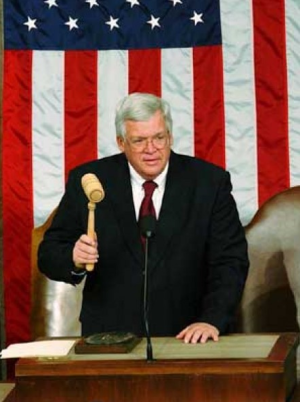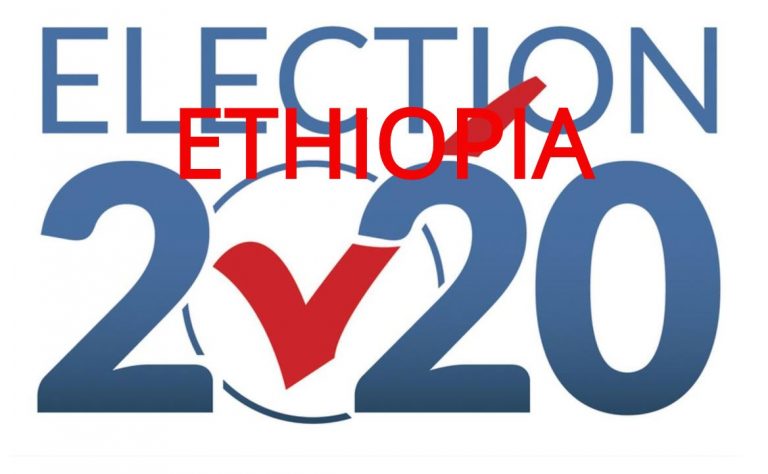Remembering Dennis Hastert
 Today, Dennis Hastert, the former Republican Speaker of the U.S. House of Representatives (1999-2007) and lobbyist appears in U.S. federal court for arraignment (enter a plea of guilty or not guilty) on charges that he broke federal law by withdrawing hundreds of thousands of dollars in cash and lying about the use of the money when questioned by the FBI.
Today, Dennis Hastert, the former Republican Speaker of the U.S. House of Representatives (1999-2007) and lobbyist appears in U.S. federal court for arraignment (enter a plea of guilty or not guilty) on charges that he broke federal law by withdrawing hundreds of thousands of dollars in cash and lying about the use of the money when questioned by the FBI.
The indictment alleges that Hastert “agreed to provide known as individual A $3.5 million in order to compensate for and conceal his prior misconduct against Individual A.” Simply stated, Hastert allegedly paid hush money to conceal claims that he sexually molested a student when he was a wrestling coach in a high school some 50 miles southwest of Chicago.
Hastert is presumed innocent until proven guilty.
Back in 2006, I had the displeasure of “crossing swords” with Dennis Hastert. It was in the early months of my accidental career as an Ethiopian human rights advocate following the Meles Massacres in the aftermath of the 2005 election. Outraged by the massacre, I had transformed myself from an armchair academic and defense lawyer into a neophyte human rights advocate.
I “signed” up to mobilize and advocate for H.R. 5680 (Ethiopia Freedom, Democracy, and Human Rights Advancement Act of 2006, sponsored by Representative Christopher Smith, D-N.J). Along the way, I crossed paths with Dennis Hastert who had used his Speaker’s privilege to keep that bill from a floor vote.
It was my very first contentious encounter with a high level American policy maker on human rights violations in Ethiopia. I mounted a mass mobilization campaign in Hastert’s (Illinois’s 14th Congressional District) district in late 2006. I gave radio interviews to various local stations in Hastert’s hometown and Chicago Public Radio.
It was my first experience in direct grassroots political mobilization. This was how I described it at the time:
… We did not take it lying down. We went directly to Hastert’s constituents and made our case. They listened to us, and in less than a week we were able to enlist the support of local evangelical, civic and media leaders. The heat was on! Hundreds of telephone calls poured into Hastert’s Hill office from the 14th Congressional district. His staffers were amazed, but not amused, by the ferocity of our grassroots efforts.
Hastert heard us loud and clear but he did not listen to us.
Despite our best efforts, we did not succeed in getting him to relent and let the bill come for floor consideration. The fact of the matter was that we simply could not compete with the late Meles Zenawi’s $50,000-per-month lobbyist. (Let me say in passing that not long after crossing swords with Hastert over H.R. 5680, I locked horns with Meles’ lobbyists at DLA Piper. DLA Piper would not take my challenge.)
I re-post my “Open Letter” here for four reasons. First, I “cut my teeth” in Ethiopian human rights advocacy by mobilizing and coordinating support for H.R. 5680. A substantial part of my initial efforts in Ethiopian human rights advocacy had to do with mobilization of support for H.R. 5680, particularly mobilizing Hastert’s constituents to pressure Hastert to support that bill. Second, I learned a great deal about human rights advocacy with the American public from my mobilization efforts in Hastert’s district. Third, Hastert’s troubles brought home to me the fact that I have been in the trenches of Ethiopian human rights advocacy for nine years and still going strong. Most importantly, I re-post the “Letter” with the hope the younger generation of Ethiopians will read it and appreciate what we all tried to do in mobilizing for and advocating passage of a human rights bill in the U.S. Congress.
It gives me no pleasure to see Dennis Hastert haled into court to answer the vilest of all criminal offenses known to civilization. But his circumstances prove to me that in the end even the most mighty and powerful have feet of clay.
As I reflect back on Dennis Hastert and what he did and did not do to H.R. 5680, I am reminded of a sermon given by the abolitionist Unitarian minister Theodore Parker a decade before the American Civil War. “I do not pretend to understand the moral universe; the arc is a long one, my eye reaches but little ways; I cannot calculate the curve and complete the figure by the experience of sight; I can divine it by conscience. And from what I see I am sure it bends towards justice.”
I believe the arc of justice shall bend towards justice for the untold number of victims of Ethiopian human rights abuses.
I also trust the arc of justice shall become a dragnet for predators who abuse the human rights of the most vulnerable members of society.
[The original post of the “Letter” is available HERE.]
====================================================================================
Open Letter to House Speaker Dennis Hastert
September 26, 2006
The Honorable Dennis Hastert
Speaker of the House
235 Cannon House Office Building
Washington, DC 20515
Re: H.R. 5680 (Ethiopia Freedom, Democracy, and Human Rights Advancement Act of 2006)
Dear Mr. Speaker:
I write this letter on behalf of hundreds of thousands of proud and loyal Ethiopian Americans who have placed their trust in the United States Congress to spread the blessings of freedom, democracy and human rights to our birthplace of Ethiopia.
Background on H.R. 5680
Mr. Speaker: Two great members of the United States Congress from New Jersey, Representatives Christopher Smith, Chairman of the House Subcommittee on Africa, Global Human Rights and International Operations, and Vice Chairman of the International Relations Committee, and Donald Payne, former chair of the Congressional Black Caucus and ranking member on the Subcommittee, worked collaboratively to craft H.R. 5680, the “Ethiopia Freedom, Democracy and Human Rights Advancement Act of 2006”. They drafted this bill with the conviction that it will help Ethiopia become a stable democratic society with strong human rights protections for the Ethiopian people, and to strengthen the Ethiopian American partnership in the global war on terror. For this purpose, Chairman Smith and Mr. Payne worked hard to persuade and enlist other distinguished members of the House to cosponsor the bill; and representatives Tom Lantos (CA), Charles Rangel (NY), Jim Leach (IA) and Martin Sabo (MN), among others, accepted the call and did so.
Mr. Speaker: Chairman Smith and Mr. Payne exerted extraordinary efforts to convince the Chairman of the International Relations Committee, Representative Henry Hyde and the 50 members of that Committee to favorably consider H.R. 5680. They succeeded in their efforts, and on June 27, 2006, H.R. 5680 passed unanimously in the International Relations Committee.
Mr. Speaker: The Ethiopian American community in the United States rejoiced upon learning that H.R. 5680 had passed unanimously in the International Relations Committee. We rejoiced because we believed, at last, the people we had left in Ethiopia, our mothers and fathers, sisters and brothers, relatives, neighbors and friends, may be able to experience for the second time in just over a year the irresistible exhilaration of democracy, and smell the wholesome fragrance of liberty and human rights. We sat in anxious anticipation when Congress took its August recess. We never doubted the outcome of H.R. 5680.
Recent Developments on H.R. 5680
Mr. Speaker: When Congress returned after Labor Day, Ethiopian Americans throughout the United States were in full celebratory mood. We felt joyous because we believed President Bush’s prediction in his second inaugural speech had come to pass in H.R. 5680:
“All who live in tyranny and hopelessness can know: the United States will not ignore your oppression, or excuse your oppressors. When you stand for your liberty, we will stand with you.”
We believed the dye had been cast for freedom, democracy and human rights in Ethiopia in the International Relations Committee, and no force could stop the freedom train carrying H.R. 5680 from the International Relations Committee to the floor of the House.”
And we waited for H.R. 5680 to show up on the House floor in early September, but we found no trace of it on the House calendar. We became concerned. We began to inquire. Mr. Speaker, our inquires yielded the most agonizing news. We learned that the train carrying the Ethiopia Freedom, Democracy and Human Rights Advancement Act to the House floor had been stopped dead in its tracks in your office. We were heartbroken; we felt let down. We began to ask questions of ourselves: “Why did the Speaker block H.R. 5680? What is it that he did not like about the bill? What reservations could he possibly have about a bill whose only aim and focus is freedom, democracy and human rights in Ethiopia?
Mr. Speaker: As we asked these questions of ourselves, we became even more bewildered: Why would the Speaker block a bill that passed with the unanimous support of the Chair and Vice Chair and 50 members of the House International Relations Committee? Why would he stop a bill authored by one of the truly great giants of international human rights, a great republican, Chris Smith, and one of the prominent experts on Africa in the entire United States Congress, Donald Payne?
We were mightily confused because we felt, if you opposed H.R. 5680 and blocked it from getting to the floor, it must surely mean Chris Smith, Don Payne, Tom Lantos, Jim Leach, Charles Rangel, Martin Sabo and all of the many co-sponsors of the bill were misguided and ill-advised in authoring and co-sponsoring it. Of course, none of these members would be part of any scheme that would subvert their constitutional duties. And so we began to inquire with your office. We made telephone calls, sent you faxes and emails. We came to your offices to be heard. We had our friends and supporters in the 14th Congressional district of Illinois call on our behalf, and find out why you had blocked the bill from getting to the floor.
We received no answers, not a single official word, from your office. We were merely informed in general terms that that you had issues and concerns about H.R. 5680.
Quandary of Ethiopian Americans Over Blockage of H.R. 5680 in the Speaker’s Office
Mr. Speaker: Your reasons for blocking H.R. 5680 from a floor vote mystify us; and we are dismayed by your silence to our inquiries.
And so, Mr. Speaker, we present our petition to you once more:
Is your concern with the language in H.R. 5680 that requires the “Secretary of State [to] establish a mechanism to provide financial support to local and national human rights groups and other relevant civil society organizations to help strengthen human rights monitoring and regular reporting on human rights conditions in Ethiopia”?
Or are you concerned about the provision having to do with “establish(ing) a program to provide legal support for political prisoners and prisoners of conscience and to assist local groups or groups from outside Ethiopia that are active in monitoring the status of political prisoners and prisoners of conscience in Ethiopia”?
Could it be the language in H.R. 5680 which “seek(s) to increase the independence of the Ethiopian judiciary through facilitation of joint discussions for court personnel, officials from the Ethiopian Ministry of Justice, relevant members of the legislature, and civil society representatives on international human rights standards”?
Or the provision which “create(s) and support(s) a judicial monitoring process, consisting of local and international groups, to monitor judicial proceedings throughout Ethiopia, with special focus on unwarranted government intervention on strictly judicial matters, and to investigate and report on actions to strengthen an independent judiciary”?
Are you concerned about the provision “encourag(ing) the Government of Ethiopia to enter into discussions with the Oromo Liberation Front to bring them into full participation in the political and economic affairs of Ethiopia, including their legalization as a political party”?
Does the provision which “establish(es) a program to strengthen private media in Ethiopia, provide support for training purposes, offer technical and other types of support as necessary, and expand programming by the Voice of America to Ethiopia” trouble you?
Is it possible that the language in H.R. 5680 which “seek(s) the unconditional release of all political prisoners and prisoners of conscience in Ethiopia” presents some ambiguity for you?
Do you find repugnant the provision which directs the U.S. “President [to] provide assistance for the rehabilitation of victims of torture in Ethiopia at centers established for such purposes”?
Mr. Speaker, please help us understand! We want to know what concerns you. What is it that you do not like about H.R. 5680?
Mr. Speaker: We know you are a great champion of human rights. We know that you are a member of the highly respected Congressional Human Rights Caucus. Your recent actions demonstrate that you are a champion of human rights. You said on August 26th in California, and just last week, that you will bring the Armenian Genocide Act (H.R. 398) to the floor of the House before the end of September. We are impressed by your commitment and courage to the Armenian Genocide Act, because we can imagine the difficult hurdles you had to overcome — strong opposition by the Turkish Government, the State Department, and Turkey’s allies in the defense and oil industries. And you have our sincere admiration for the courage and determination you have shown to bring the Armenian Genocide Act to the floor.
But then we looked at our situation, and asked the obvious question: “If Mr. Hastert can help Armenian Americans, why couldn’t he help us? Why wouldn’t he allow H.R.5680 to just tag along H.R. 398 to the floor?”
Mr. Speaker, we are in a quandary. We are at a loss.
Opponents of H.R. 5680
In all candor, Mr. Speaker, the Ethiopian American community believes that the legislative intent and aims of H.R. 5680 have been mischaracterized by opponents of the bill, and the lobbyists for the Ethiopian government.
We believe you have been misinformed on H.R. 5680: that the bill will undermine American counter-terrorism efforts in the Horn of Africa, particularly in light of the recent crisis in Somalia, that it could strain the Ethiopian American partnership in the war against terror, that is really the work of Ethiopian elites in America who have an axe to with the government and has no real support among Ethiopians or Ethiopian Americans, that its passage will derail and reverse the economic growth in the country and “calamity” will befall the millions of ordinary Ethiopians if H.R. 5680 were to pass. We also believe that you have heard laudatory words about Mr. Zenawi: one of a new breed of African leaders, dedicated to democracy and human rights, a loyal and dutiful friend of America, a dependable partner in the global and regional war on terror.
We also believe you have been misled on the issue of political prisoners, and the demand in the bill for their immediate release. As you are aware, the top leadership of the opposition and numerous independent journalists and many others remain incarcerated today in Ethiopia for exercising their consciences. As aptly stated in H.R. 5680, the opposition leaders “were imprisoned and charged with treason and genocide. These measures were deliberately taken to stifle and criminalize opposition party activity in the country. The measures also were intended to intimidate and silence independent press and civil society, raising serious question about the Ethiopian Government’s commitment to democracy and good governance.”
Mr. Speaker: Passage of H.R. 5680 will have no negative impact on U.S. counterterrorism efforts in the Horn of Africa. The suggestion that passage of the bill undermine the role played by the Ethiopian government in cooperating with the U.S. is unfounded because the bill provides a clear exception to “humanitarian assistance, assistance under emergency food programs, assistance to combat HIV/AIDS, and other health care assistance [and does] not apply with respect to peacekeeping or counter-terrorism assistance.”
Similarly, Mr. Speaker, the current Somali crises has nothing to do with freedom, democracy and human rights in Ethiopia. If anything H.R. 5680 sends a stern and unmistakable warning to those regimes in the region that provide support and aid to terrorists. As President Bush stated in his March, 2005 speech at the National Defense University on the centrality of promoting democracy as a potent weapon in the war against global terrorism:
“Our strategy to keep the peace in the longer term is to help change the conditions that give rise to extremism and terror, especially in the broader Middle East. Parts of that region have been caught for generations in a cycle of tyranny and despair and radicalism…. It should be clear that the best antidote to radicalism and terror is the tolerance and hope kindled in free societies. And our duty is now clear: For the sake of our long-term security, all free nations must stand with the forces of democracy and justice that have begun to transform the Middle East.”
Mr. Speaker, that is all H.R. 5680 aims to do, help the “forces of democracy and justice that have begun to transform” Ethiopia.
Issue of “Sanctions” in H.R. 5680
Mr. Speaker: We believe the crux of the issue and your concerns with H.R. 5680 most likely have to do with the so-called sanctions provisions of H.R. 5680. Indeed, the word “sanctions” is a misnomer, because the bill contains only reasonable accountability provisions.
The accountability provisions in the bill are twofold: First, there are restrictive provisions which prohibit delivery of “nonessential United States assistance to the Government of Ethiopia if the Government of Ethiopia acts to obstruct United States technical assistance to advance human rights, democracy, independence of the judiciary, freedom of the press, economic development and economic freedom in Ethiopia.” This restriction does not apply to humanitarian assistance and counter-terrorism and peacekeeping assistance. (Emphasis added.) There is also a travel restriction on “any official of the Government of Ethiopia who has been involved in giving orders to use lethal force against peaceful demonstrators in Ethiopia, or has been accused of gross human rights violations.”
Second, there are reporting and certification provisions which require (1) the U.S. President to present “to Congress a report on the implementation of this Act, including a description of a comprehensive plan to address the security, human rights, democratization, and economic freedom concerns that potentially threaten the stability of the Federal Democratic Republic of Ethiopia”, and (2) certify to “Congress that the Government of Ethiopia is making credible, quantifiable efforts to ensure that all political prisoners and prisoners of conscience in Ethiopia have been released, the Ethiopian judiciary is able to function independently, the investigation of the killing of civilian protesters by Ethiopian security forces is credible, transparent, and those involved in the unlawful killing are punished and print and broadcast media in Ethiopia are able to operate free from undue interference and laws.”
These are reasonable, and not burdensome accountability provisions.
Mr. Speaker: Regardless of the foregoing accountability provisions, the U.S. President is invested with waiver authority under the bill, and he may decline to apply the relevant provisions of the bill if he “determines that to the maximum extent practicable, the Government of Ethiopia has met the requirement of paragraph and such a waiver is in the national interests of the United States.” There is really no concern.
Mr. Speaker: We surmise that you have been told that the accountability provisions in the bill will somehow serve to embolden and strengthen Mr. Zenawi’s opposition in Ethiopia and abroad, and that his opponents will use this bill to undertake other hostile legislative efforts. Such arguments have no merit, and merely seek to divert attention from the real issues at hand, namely, the need for reasonable mechanisms to promote freedom, democracy and human rights in Ethiopia.
We suspect, Mr. Speaker, that you have probably been told that the accountability provisions of H.R. 5680 will cause international embarrassment to Mr. Zenawi and stigmatize him and his government as violators of human rights. But if there is any such stigma, it is not found in H.R. 5680. One must look elsewhere in the reports of the United States State Department Annual Human Rights Reports, and Amnesty International and Human Rights Watch reports for evidence.
Mr. Speaker: We are sure you agree that accountability is the soul of any meaningful piece of legislation. Without accountability, H.R. 5680 will not be worth the paper it is written on. And if H.R. 5680 were to pass without its accountability provisions, it would not only lack teeth, it will be a mockery of the hard work and efforts of Chris Smith and Don Payne and all of the others members who have cosponsored the bill. It would be ultimately a mockery of a solemn act of the United States Congress. It would be worse than having no law at all, because H.R. 5680 without accountability would be an empty proclamation that tells the Ethiopian people that U.S. Congress gives only lip service to their yearning for freedom, human rights and democracy. There must be accountability! Mr. Speaker: Let me emphasize again that there really should be no concern with the accountability provisions of H.R. 5680.The accountability provisions apply only, and only, if the Ethiopian government fails to carry out the freedom, democracy and human rights provisions of the bill; and the President has full discretion to waive application of the provisions if he makes certain determinations or finds waiver to be in the national interest of the United States.
But Mr. Speaker, there is even a more compelling reason why you should have no concerns at all about the accountability provisions. It is unlikely that they will ever be applied because Mr. Zenawi and his ruling party in Ethiopia have always proclaimed that “Ethiopia is a true democracy. Human rights are respected, and the rule of law is supreme in Ethiopia.” H.R. 5680 would only make their jobs infinitely easier, and provide them $20 million to implement practically what they have been professing to the world for well over a decade now. You should have no concerns.
But as President Bush stated in June, 2003, “Notorious human rights abusers, including, among others, Burma, Cuba, North Korea, Iran, and Zimbabwe, have long sought to shield their abuses from the eyes of the world by staging elaborate deceptions and denying access to international human rights monitors.”
H.R. 5680 without its accountability provisions will itself serve as “shield of abuse.” The Ethiopian government will trumpet to the world that the U.S. Congress passed a law which has no binding legal effect; that Congress did so because Congress believed the Ethiopian government has an unblemished human rights record, and an unquestioned commitment to democracy. Indeed, such a view would be manifestly justified if H.R.5680 were to pass without its current accountability provisions.
But Mr. Speaker, the so-called sanctions issue is a non-issue, and unsupported by any legal or informed political analysis. We must have the current accountability mechanisms in H.R. 5680 if the U.S. is serious about freedom, democracy and human rights in Ethiopia.
The Clock is Running on H.R. 5680
Mr. Speaker: As you are well aware, the clock is running on H.R. 5680. We know that if H.R.5680 is not placed on the suspension calendar by September 27, 2006, it will not 8 have much of a chance to be considered this year. Surely, we do not doubt your authority to make things happen in the House; and we believe you can send H.R. 5680 to the floor on the last day of the legislative session, if you so choose. But realistically, if H.R. 5680 is not on the suspension calendar by midweek, it is unlikely to be up for floor consideration this year.
Mr. Speaker: We Ethiopian Americans despair over the fate of H.R. 5680 in your office. We are deeply disappointed by what appears to be a silence of indifference in your office. We are wondering if you have turned a deaf ear to our pleas for help? Many of us despair that you have abandoned us, and the cause of freedom, democracy and human rights in Ethiopia.
In our desperation, we have sought refuge among the good people of DuPage, Kane, Kendall, LaSalle, DeKalb, and Lee counties in Illinois. Many of our Christian brothers and sisters, and all people of faith in Illinois, have opened their arms and commiserated with us, and cried with us over the misfortunes we have experienced in getting H.R. 5680 to the floor. By the hundreds they volunteered to help us, intercede on our behalf. We are deeply grateful to them for their assistance in calling your office on our behalf.
Mr. Speaker: As the hour hand sweeps ever so closely to midnight on H.R. 5680, many in the Ethiopian American community have given up hope that you will relent and allow the bill to get to the floor this legislative session. But I tell them they are wrong, dead wrong: that even in the midnight hour, you will be with us. You will be shepherding H.R. 5680 to the floor of the House.
Mr. Speaker: We Ethiopian Americans are new to the American political process. We are new to grassroots advocacy. We lack the sophistication and polish of the professional lobbyists. We do not have the savvy and cleverness of those professionals who can talk to members of Congress in pithy phrases and diplomatic eloquence.
But as we take “baby steps” in the American political process and begin to exercise our democratic rights under the U.S. Constitution, we feel empowered and our spirits are uplifted into the heavens by the knowledge of the freedoms guaranteed us under this sacred document. And so, as we place our petition in your hands to let H.R. 5680 go to the floor, we are ever so mindful and thankful for what America has given us — a precious gift of freedom and liberty that we could not get anywhere in the world, least of all in the country of our birth.
Mr. Speaker: As we feast on the cornucopia of freedom in America — the freedom to speak our minds, to petition the highest officers of our government, to freely associate and assemble with our American friends, live our lives with fear of a midnight knock on our doors — we remember our mothers and fathers, sisters and brothers, and the friends, relatives and neighbors we have left in Ethiopia; and we are saddened. We are saddened because free speech, freedom from arbitrary arrest and detention, honest elections, a fair justice system are all forbidden fruits to them. Yes, they may take a chance to taste these fruits, but they may have to pay with their lives. And many have paid with their lives.
And so, Mr. Speaker, we Ethiopian Americans of all faiths believe in the power of prayer. We will pray that you will have a change of mind, that God will guide your heart and direct your hand to pick up H.R. 5680 from the International Relations Committee and deliver it safely to the floor of the House so that the representatives of the American people could pass judgment on it. We will pray that God will show you that our cause of freedom, democracy and human rights is the same cause the Founders of the American Republic defended in the American Revolution — that “all men are created equal by their Creator and have the inalienable right to life, liberty and the pursuit of happiness.” We call upon you to hearken to the memorable words of President Bush: “All who live in tyranny and hopelessness can know: the United States will not ignore your oppression, or excuse your oppressors. When you stand for your liberty, we will stand with you.” Mr. Speaker, stand with us! Help us! Be that strong link in the chain of freedom, democracy and human rights forged by Chris Smith and Donald Payne in the House International Relations Committee. History will remember you that when the clock struck midnight, you were on the side of your proud and loyal Ethiopian American constituents, and not the distant tyrants repudiated by their own people.
Mr. Speaker, we make a final appeal to you:
Let freedom ring in Ethiopia!
Let democracy flourish and thrive in the land of the Blue Nile!
Let human rights triumph for our mothers and fathers, sisters and brothers, friends, relatives and neighbors in Ethiopia!
Let H.R. 5680 go!
GOD BLESS AMERICA!
Sincerely,
Alemayehu G. Mariam, Ph.D. J.D. (Esq.,)
Professor and Attorney at Law
cc:
President George Bush, The White House
Dr. Condoleeza Rice, Secretary of State
Mr. Donald Yamamoto, Ambassador Designate to Ethiopia
United States House of Representatives:
Hon. Nancy Pelosi Hon. Dana Rohrabacher
Hon. Henry Hyde Hon. Jim Moran
Hon. Christopher Smith Hon. Loretta Sanchez







